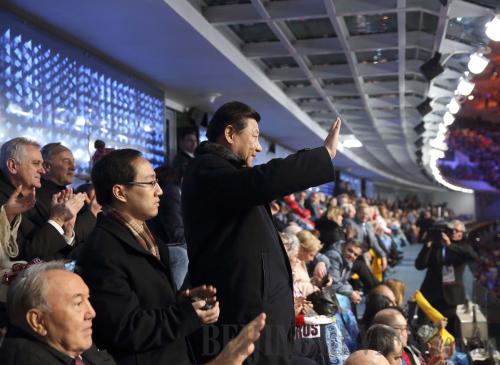|
 |
|
GREETING SOCHI: Chinese President Xi Jinping waves to athletes during the opening ceremony of the 22nd Winter Olympic Games in Sochi, Russia, on February 7 (LAN HONGGUANG) |
The snow-covered Sochi, home to the 22nd Winter Olympic Games, was also the host of an increasingly warm relationship on display between two giant neighbors—China and Russia. During their meeting in Sochi, the presidents of the emerging powers agreed to advance bilateral relations by promoting practical economic and cultural cooperation as well as strengthening connections on global issues.
The year 2014, which marks the 65th anniversary of the establishment of their bilateral diplomatic relationship, will be an important year for enhancing the friendship between China and Russia as well as their strategic coordination in realizing their dreams of prosperity.
Olympic spirit
Chinese President Xi Jinping arrived in Sochi on February 6 to attend the opening ceremony and met with his Russian counterpart Vladimir Putin. It was their sixth meeting in the past year, in addition to three phone calls and a total of 16 letters and greetings. The increasing communication illustrates the close relationship between the two leaders and the two countries.
The Olympic Games provides a platform for sports diplomacy as well as a global athletic contest. The Sochi trip was Xi's first foreign visit in 2014, as well as his first attendance at a foreign sporting event as China's head of state since taking office in March 2013.
"President Xi's visit was not only a state head diplomatic activity, but also a public diplomatic activity, which shows his respect for China's giant neighbor," said Xing Guangcheng, a researcher on Russian studies with the Chinese Academy of Social Sciences (CASS). He noted that Putin, who was Russia's prime minister in 2008, also participated in the opening ceremony of the 2008 Beijing Summer Olympic Games.
The presidents' meeting in Sochi was warm and sincere. The Chinese president said that hosting the Olympics showed Russia was on its way to prosperity under Putin's leadership. Putin expressed appreciation for the Chinese president attending the opening ceremony. The Russian president said that Xi's trip shortly after the Chinese Spring Festival was like reuniting with a good friend.
Li Jianmin, another researcher from the CASS, pointed out that Xi's attendance showed China's open attitude to the world and its self-confidence in the international community, in addition to its strong support for Russia's hosting of the international sporting event.
This was the first time Russia has hosted a major international sporting event since the 1980 Summer Olympic Games in Moscow. To Russia, this was not only a witness of Russia's sports achievement, but also its return to a major global power on the world stage, said Li. Russia spent $51 billion in the past seven years to prepare for the games, and over 160,000 Russians applied to be volunteers.
Previously, many in the Western media called for protests of the Sochi Olympics for reasons such as Putin's tough stances on global issues, Russia's anti-homosexuality law and corruption in the country. Under such circumstances, President Xi's attendance to the opening ceremony indicated China's support on important issues concerning Russia, marking the rapid development and specialness of the China-Russia relationship, Li stressed.
Mutual prosperity
Bilateral economic cooperation is warming up as well. During the meeting in Sochi, the two presidents agreed on the construction of the Silk Road Economic Belt and the Maritime Silk Road, initiatives that China first proposed in 2013.
As China is working hard to realize the Chinese dream, Russia also has a 20-year plan for the country's prosperity and renaissance, which makes promoting bilateral economic cooperation a shared demand. Jin Canrong, Vice Dean of the School of International Relations at Renmin University of China, stressed that economic cooperation will occupy a bigger proportion of the China-Russia relationship in 2014. "They are in mutual need of one another," said Jin, explaining that large-scale projects will be an important part of bilateral economic cooperation.
| 